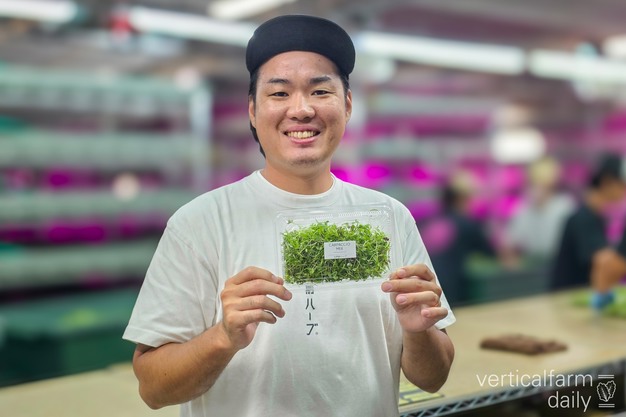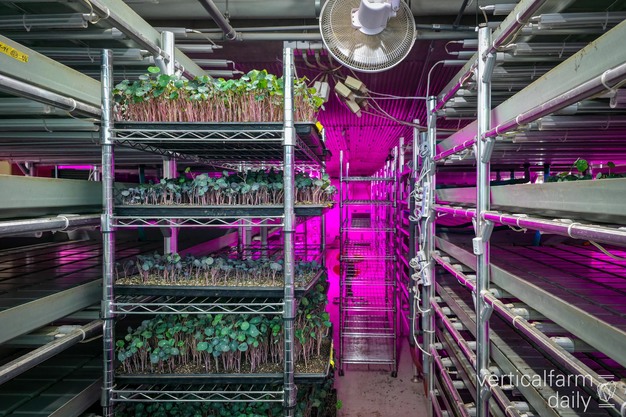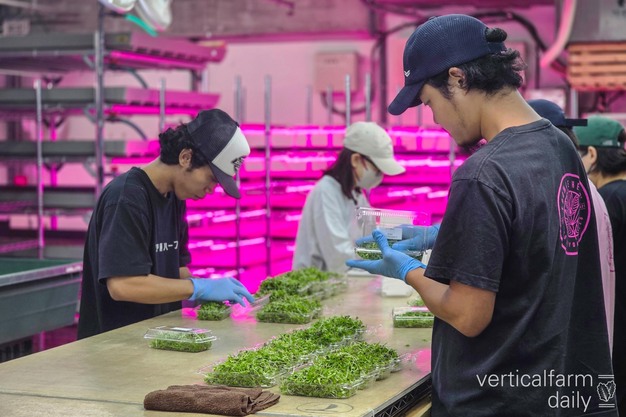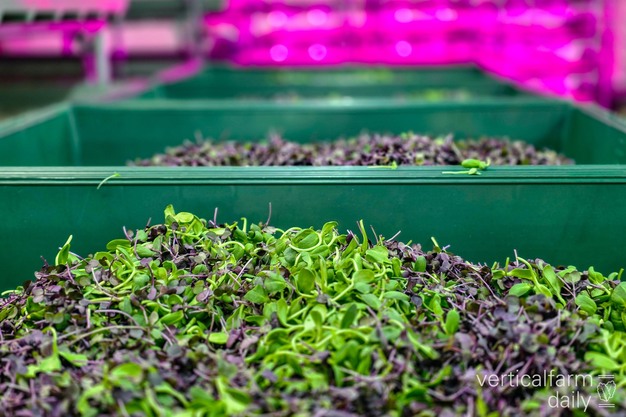"The economics of our microgreens are very promising. Mizuna can sell for around 80 dollars per kilo, compared to 30 dollars for baby greens. Growing cycles are also shorter, just 7 to 10 days compared to a month for larger leafy crops," says Kohei Murata, founder and CEO of Edomae Herb.
 © VerticalFarmDaily.com
© VerticalFarmDaily.com
Kohei Murata holding a pack of carpaccio mix
The Tokyo based vertical farm is using a slightly different method than all of its peers: growing in soil. While hydroponically grown microgreens are more popular domestically, Kohei believes that taste and texture set his produce apart. "Hydroponics can sometimes taste a bit watery, but with soil the flavor becomes more intense and explosive. We stick to organic methods without chemicals because the taste becomes much richer that way."
Producing up to 200 kilos of microgreens per week across two farms. The second facility comprises 240 m², which is four times larger than Edomae's first Tokyo farm. Kohei's focus on organic growing in soil has made him the largest microgreens grower in Japan, without using any external funding. "I took a bank loan, but the company is 100 percent mine. That way I have all the power to myself," he proudly shares. For now, expansion is steady but cautious. Specialty stores like Isetan in Nihonbashi show demand for premium microgreens, treating them as a luxury rather than a commodity.
Click here to view the photo report.
 © Rebekka Boekhout | FreshPlaza.comEdomae's Tokyo farm, where most of the products have been harvested
© Rebekka Boekhout | FreshPlaza.comEdomae's Tokyo farm, where most of the products have been harvested
Niche market, premium clients
Eighty to ninety percent of orders are for the standard mix, which includes sunflower, radish, and brassicas, but chefs also request dill, Italian parsley, and chervil. Harvesting is done daily in the mornings to guarantee freshness. Shelf life is around two weeks, with immediate mixing and packing after harvest.
Edomae sells almost exclusively to restaurants and hotels, with only a small percentage of products going to supermarkets. Ninety-nine percent of its sales go directly to the food service industry. "Indoor soil-grown produce is not yet a big market in Japan, especially for microgreens. Babygreens are better known, and only Murakami Farm is famous for microgreens here, through a Koppert Cress license," Kohei says.
Despite the current market size, Edomae has established itself as a trusted supplier. Chefs value not only the freshness but also the story behind the products. The brand name Edomae refers to craftsmanship and freshness, similar to the tradition of Edomae sushi made from fish caught in Tokyo Bay. "Chefs like that it's local. They visit the farm, give feedback, and sometimes even share recipes with us. The story matters as much as the greens," Kohei notes.
Click here to view the photo report.
 © Rebekka Boekhout | FreshPlaza.comProduce is harvested the same day
© Rebekka Boekhout | FreshPlaza.comProduce is harvested the same day
Trial and error
"Seven percent of our revenue goes to energy, which is a lot. The share is decreasing as sales increase, but it's still a challenge. If the yields get higher, we can decrease the number of trays we grow so that all the cost will go down. We are now testing to get more yields," Kohei explains.
As shared in our Japan market update, labor costs in Tokyo are also rising, which puts a lot of pressure on margins. Nevertheless, operating in Tokyo gives Edomae a key advantage: imports carry massive transport costs, while local production can be delivered fresh and affordably through distribution partners.
"I failed many times. The stems were too long, and the taste was poor." Avoiding further downtime, Kohei asked for help from the Canadian firm, Microgreens Consulting. Jonah, a former microgreens grower, helped Edomae to tweak its growing parameters and one month later, Kohei finally succeeded. "The trick is to keep stems short, because the shorter the stem, the better the head tastes."
To achieve constant premium quality, the farm controls propagation and lighting carefully. A shorter blackout phase during propagation helps prevent the seedlings from stretching, while light intensity and lighting duration influence stem growth. Currently, crops receive around 14 hours of light daily, though Kohei experimented with longer cycles. Substrates are reused wherever possible. After a six-month resting period, spent trays, still rich in nutrients, are given to outdoor farmers in Chiba. Seeds are sourced from Johnny's Selected Seeds in the US, while equipment such as crates and lighting comes from Chinese and Japanese suppliers.
 © Rebekka Boekhout | FreshPlaza.com
© Rebekka Boekhout | FreshPlaza.com
Connecting with chefs
One of Edomae's strengths is its close relationship with chefs. In the early days, Kohei personally visited restaurants weekly to present samples and listen to feedback. "It went very quickly once one famous chef started using our microgreens and posted about it on his socials. Japan's high-end food community is relatively small, and many people follow the same chefs. So if you work with a famous chef, others will follow."
Today, Kohei has less time to go out and spend time with chefs in a restaurant. Although the connections remain strong, he believes these relationships are key to building the market, as it's not just about the story. "It's about quality and relationships. We don't sell to everyone, only to those we're connected with organically. That keeps the service consistent."
Would you rather expand this into a large operating facility or build small-sized farms nationwide? "I see much more potential in expanding through smaller farms rather than scaling up into massive facilities. You can control quality and relationships much better when your operations are small. On top of that, I think the effect is much bigger when you can maintain those direct, personal relationships with your customers." Certification could also become a differentiator, but only if the market is willing to pay a premium. "If I have to pay for certification, I will increase prices. But for now, we are already cheaper than imports. I would like to keep it this way."
Click here to view the photo report.

For more information:
Edomae Microgreens
Kohei Murata, Founder and CEO
[email protected]
https://goodfeels.thebase.in
